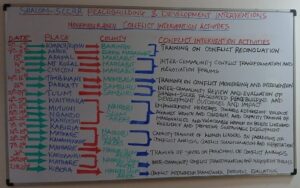By: Judith Akedi MA,
Stellenbosch University, a public research university situated in the Western Cape province of South Africa, hosted Rev. Dr. Patrick Devine, the Shalom-SCCRR International Chairman, during 2022 to present for the first time an academic module of lectures addressing conflict transformation processes and religious ideological extremism.
In his letter of invitation to Rev. Dr. Devine, Professor Xolile Simon, Associate Professor in African Religions, Intercultural Theology, and Science of Religions stated, “We realized how the theoretical, theological, spiritual, and practical dimensions in the programme of SHALOM coincide well with the programme of Missiology and Science of Religions in the Faculty of Theology at the University of Stellenbosch, South Africa. We are currently focusing on the intercultural and interfaith engagements in a Ministry of Reconciliation and Justice in the Master of Divinity (MDiv) programme. Both engagements are relevant for leaders who respond to various social and other issues in the environment of local communities and Universities on the African continent. Your contribution (experiences, life story, theory, and practice of SHALOM in East Africa) to the intercultural and interfaith journeys of students and colleagues in and outside the classroom – in the broader Students Community will enrich transforming realities through the MDiv and other programmes.”
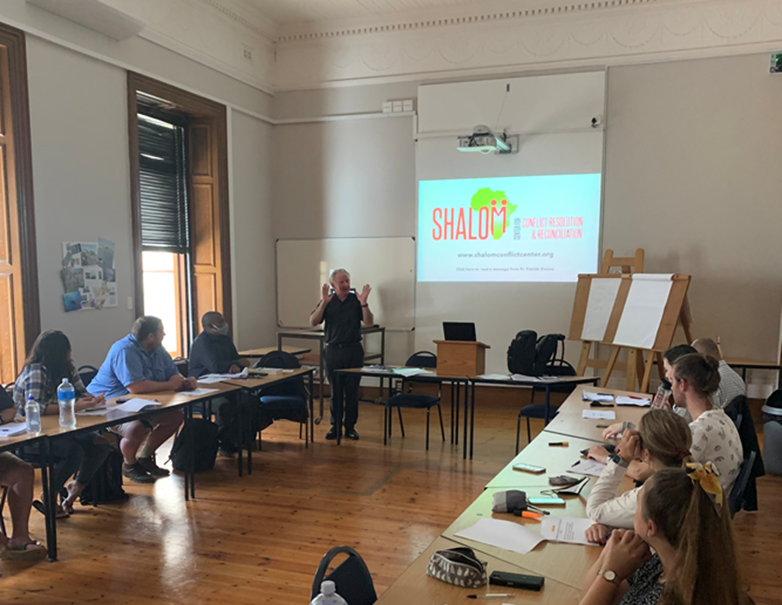
South Africa emerged from apartheid in 1990s with high aspirations for the country’s transformation from a conflict crisis-plagued state to a more integrated cohesive situation that would cater for the needs of the various races and groups that make up the country. Shortly after independence, the country embarked on a series of social and conflict transformational programs. Shalom-SCCRR was glad to contribute professionally to the ongoing process, having a deep concern for the all the people of Africa and their inter-connectivity.
The methodology of Shalom-SCCRR was considered relevant for leaders who respond to various social, religious and other issues of development in complex conflict environments and on campuses of higher education in universities on the African continent. Shalom-SCCRR’s unique approach integrates empirical research, rigorous conflict analysis underpinning conflict transformation interventions at the individual, relational, structural/institutional, cultural and religious levels, leading to reconciliation forums. Shalom-SCCRR has been assisting universities in sharing lectures and presentations on its unique academic and practitioner methodology in Africa, Europe and the USA (Tangaza University College – a constituent college of the CUEA in Nairobi Africa, Queens University Belfast – N. Ireland, and Harvard Law School to name a few), for over 10 years.
The participants at Stellenbosch University are all currently pursuing a Master of Divinity (MDiv) in Church Ministry. Rev. Dr. Devine’s lectures/presentations were designed to provide students and peace practitioners with the conflict analytical skills and peace-building techniques needed to transform manifest and structural violence, empowering reconciliation in deeply divided societies. “Structural violence is present when human beings are influenced so that their somatic and mental realizations are below their potential realizations” (Galtung, 1969).
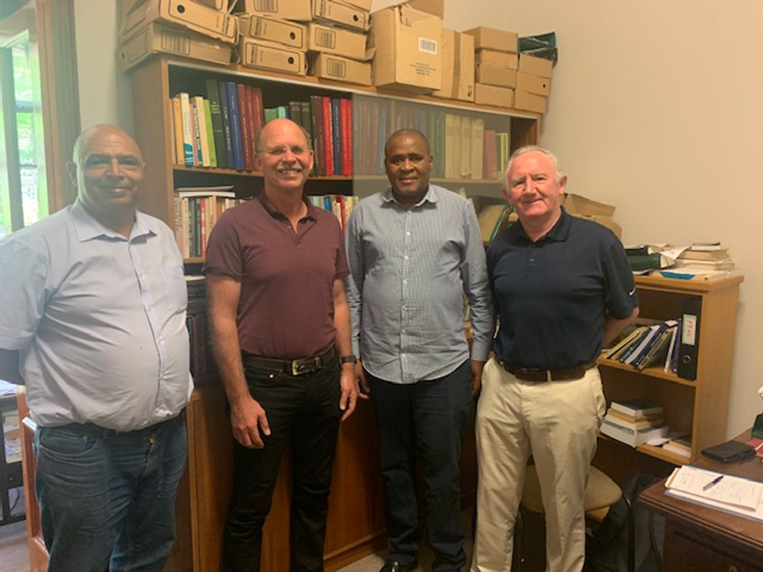
From a religion perspective the module focused in particular on the dangers of religious ideological extremism in the world today. The objective emphasized the need to move beyond mere inter-religious dialogue to ‘dia-praxis’. At the core of dia-praxis is the inter-religious dialogue becoming evidenced in jointly agreed policies and tangible social projects whereby adherent of different religions and religious denominations develop societies of inclusivity and reconciliation respecting human dignity and rights. “When religion becomes disproportionately preoccupied or energized by increasing quantitative institutional membership, to the detriment of qualitative spiritual transformation, the potential for it becoming a destructive factor in conflict generation escalates” (Devine, 2017).
The South African context was given particular consideration, through the voice of its history and the students, staff, and peace practitioners present. According to Devine (2021), “Conflict has a memory that is transgenerational, resilient, robust and anchored in culture, but frequently contaminated and distorted with erroneous historical narratives. Mendacious propaganda, demonization and hypocrisy never benefit the ‘road maps of peace’ that lead to mediation/negotiations processes essential for the emergence of conflict settlement (negative peace) and resolution (positive peace/reconciliation)”.
Several participants registered their appreciation and reactions for the insights and inputs during the three-day course. Carli Benade expressed, “This week we had a privilege to step into conversations with Fr. Patrick Devine on the notion of reconciliation in South Africa. This is such an important conversation in our context as young theologians, students and involved parties. It is our mission to further reconciliation in South Africa. Fr. Patrick has given us the tools to be able to not only talk about reconciliation but to also empower others to actively participate. I have learnt so much in the past week and it is an honor to now be part of Shalom’s global community of change makers.”
In her reflection, Simone Abrahams, a student of MDiv expressed, “From the start of our sessions with Fr. Patrick, I felt the presence of indescribable inspiration. The views and concepts shared with us have, in some way formed my own knowledge and understanding of conflict resolution. It is a school of thought I would more than likely continue to learn about and in fact integrate the necessary skills within my own ministry. Although I feel I might want to further this practice and fulfill my own dream of participating in mission activities. Thank you, Fr. Patrick, for sharing your abundant knowledge and wisdom. You have been a true source of light and inspiration. May the Lord bless you and keep you.”
Mattheus Vorster pointed out that, “It was wonderful experience to learn and engage with Fr. Patrick Devine on matters of justice and reconciliation. With our country’s understanding it has always felt like we are not moving forward, and we have a distorted image of what justice is. It was eye-opening to understanding what peace is, that peace does not necessarily mean an absence of violence. But rather we have negative and positive peace. I feel going forward within my own ministry, denomination, community and country I can be a representative of peace, truth, justice and mercy.”
In expressing his gratitude, Lyndon Mactavie expressed, “I want to express my gratitude to Rev. Dr. Patrick Devine for providing me with the necessary tools for dealing with conflict. You offered me the vision of engaging in a fresh way and assisting in the reconciliation process. South Africa has a sad history, but with the tools from this course, we may look at a new South Africa and be truly vulnerable and open to hear other people’s tales. We appreciate you for the amazing work that you are doing and preaching the gospel of God. As Shalom Centre, you are the living embodiment of God’s message, and we applaud your faith in working in such perilous settings. May God bless Shalom beyond your wildest dreams, and may this center become the beating heart of a global plea.”
Karla Bekkler, another student expressed, “the experience of the last three days was very interesting and will be very helpful, not just for now but most definitely for the future in ministry. I enjoyed the reconciliation because we talked about subjects that are very true in today’s time and need. I can most definitely use the truth, mercy, justice and peace knowledge impacted because I have seen how important it is. We really need this in South Africa because we are dealing with issues from the past that are still unresolved.”
In his reflection, Erich Zutch expressed, “As I write this reflection, I am reminded of the power of connectivity and networking. Regardless of denomination, ethnicity and religion, we are all connected by our desire and need for a harmonious human flourishment. It is this longing for interdependent well-being that serves as our ‘binding’ call to such peace. In doing so, we are called to participate in the reconciling work of God’s kingdom on earth between humans and God and humans with each other. I am thankful for the deepening of my conceptual language with regard to managing conflict. Terms such as negative and positive peace are of great assistance in this regard. Above all, this short course serves as an encouragement and a hopeful message for those who envision a future of human flourishment.”
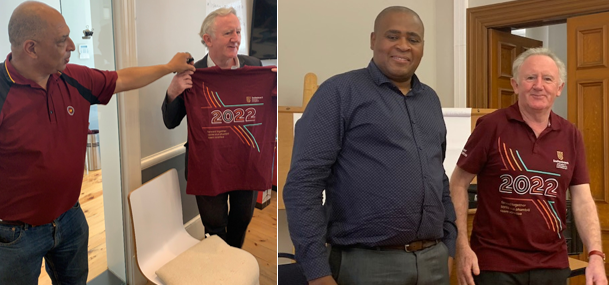
Marisa Piennar acknowledged that, “This week has been an amazing, life changing journey and I am so happy and blessed to have had the opportunity to take part and learn from Fr. Patrick Devine. I especially enjoyed the session on reconciliation, as I think it is really important within the South African context we are all living and working in. In my reflection I also find it important to note the session we had on religion and conflict, where we focused on religious-based justification of violence. I wish we could have more opportunities in the future to engage with Father Patrick Devine and the Shalom Center for Conflict Resolution and Reconciliation. Just as reconciliation has four pillars of truth, mercy, justice and peace, each contribute important value to the subject of reconciliation. This week Fr. Patrick has lighted a flame in me and for that I am forever thankful. I cannot wait to work with him and learn from him again.”
In their closing remarks, the fifth-year student expressed, “We as 5th year theology students have been faced with numerous discussions and courses that emphasize the injustices present in South Africa. In fact, we are faced with these injustices on daily bases, it is part of our South African society. Because of these injustices, we are then also challenged with the need for reconciliation, not just in our daily lives but in our academic programs. These concerns with justice resonate deeply within me, and I carry within myself a strong sense of compassion that wants to realize this justice and reconciliation. What the sessions with Shalom have done, however is provide us with a certain theoretical foundation that can assist in endeavors aiming for positive peace. The task of peace-making is still a daunting one, but these sessions have in fact given me some hope that peace, justice, reconciliation all these things are actually attainable. For that I am incredibly grateful” (Zandre Marais).
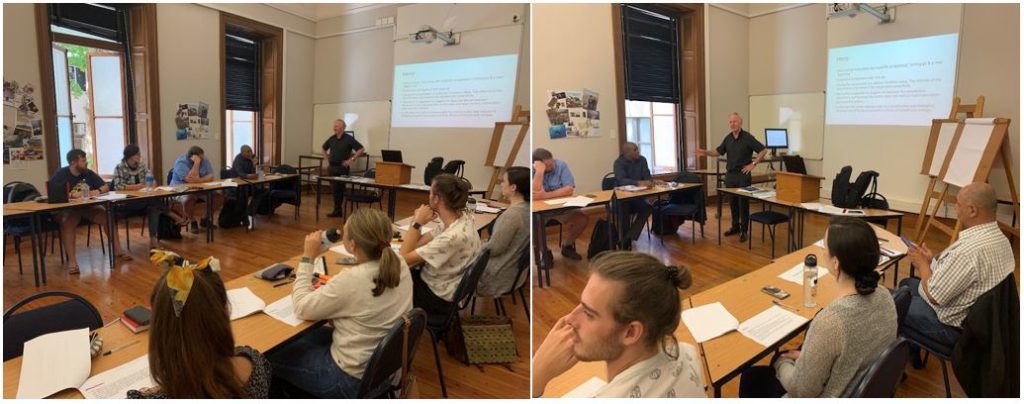
In a separate reflection on the lectures, Annamari Booysens acknowledges that it is not enough to say we must not wage war, it is also necessary to make sacrifices to reconcile communities in conflict situations. She narrated, “Having Fr. Devine come and talk to us about Shalom ministries and the work they are doing in various parts of the world has been eye-opening, especially when we reflect on the way the church plays a role in all of this. Some of the students challenged the involvement of the Church in conflict transformation, terming the Church’s involvement as, “being a lot of bark but little bite” and that this lecture had offered them the necessary tools and skills of proper engagement in conflict issues.
“What stands out for me is moving from multicultural to intercultural, and having conflict arise with no way of addressing it, this week has given us a way to address it and implement it. A lot of time there is a lot of negative peace, and often times we do not even recognize it. Having it shown to us, and provide us a way to move from negative peace to positive peace, and to conflict resolution as well, has been a very critical tool to have. We live in a country where we are constantly met with structural violence, historical inequalities, and violence against women and children, and it is easy to talk about it, but addressing the problem is the problem. Thus I would like to thank Father Devine and the work of Shalom Ministries for what they are doing, and thank them for providing us with the necessary framework and paradigm, to address the problem and not just talk about it.” (Annamari Booysens)
In a further reflection of what was striking for her, Annamari Booysens acknowledged that “The first thing that stood out for me was the following quote: “Theory without practice is empty and practice without theory is blind.” This is something that resonates with me and that I will take with me. It was very insightful to learn about negative and positive peace, and the impact it has on communities. Something else that also stood out was the saying “that evil prevails if good people do nothing.” I see this as an everyday challenge to be active and involved in the lives of people. I was also made aware of the fact that we need to focus on grass root level and not just focus on symptoms, but rather the root causes. I really enjoyed learning from Fr. Devine and being able to engage in conversations about peace, conflict resolution and reconciliation. This week has been insightful and it guided me to form critical thinking regarding these themes. I am grateful to have had the opportunity and hope to work with Shalom again.”
In a separate reflection, Andene notes that, “I have gained a wealth of information and a treasure chest of wisdom in the last three days. Although it was a very short amount of time to learn about conflict resolution, the time we spend was valuable and truly transformative. This has given me great hope for the future, as I have not only learnt a great deal but also seen that the path to justice and reconciliation is indeed achievable through the love, mercy and grace of God. Thank you so much for spending these few days with us. It was a great privilege and it has most definitely left a lasting impact on me. I pray that our paths will cross again one day soon.”
Belicia Reader expressed, “The days were packed with great information surrounding peace, reconciliation as being more than just trying to find a superficial answer to conflict, and handling negotiations and transformation. The figure used at the beginning of the week that shows the evolution from conflict ‘negative peace’ and eventually reaching ‘positive peace’ is the image that I constantly kept in mind through the week. The words that keep coming to mind to describe this week is, this is a process where violence in a specific geographical location is identified, this violence is addressed through paradigms of conflict analyses, this can only happen when we make use of building relationships – with the focus on the four key words of peace, truth, justice, and mercy- relationships can only start to happen through doing good research with primary sources but also observing and insertion in the conflict situations, leading to the conflict transformation that are expressed through two fundamental ways of descriptive and prescriptive – with personal, relational, structural, and cultural dimensions that influence conflict, leading to reconciliation that seeks to go deeper than just an answer but tries to take into conversation people’s perceptions, feelings and experiences to contribute to a relationship build on truth, mercy, justice and peace. All of this is taking place in pre-negotiation, actual negotiation, and post-negotiation where distributive bargaining is not the goal but a deeper answer and search to integrative bargaining to ensure both or all parties are satisfied in the reconciliation process.
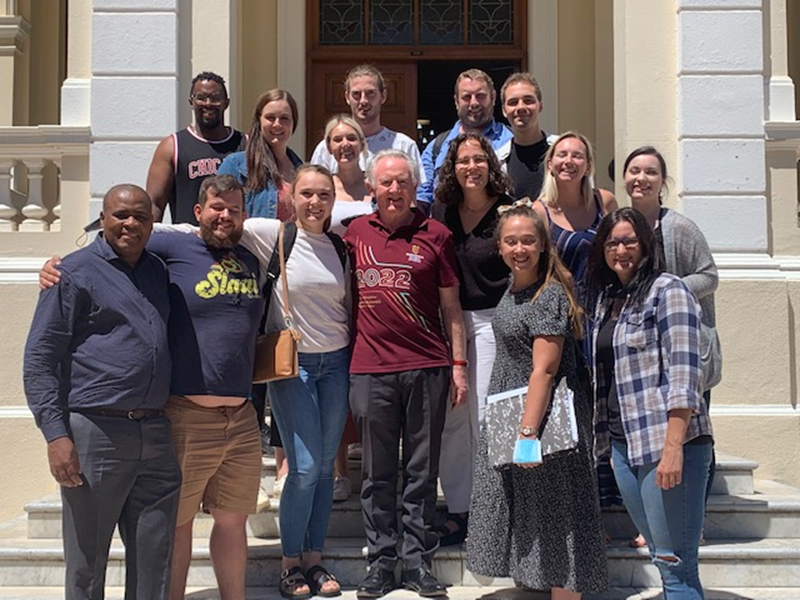
In the end, we see that peace is much more than just voicing problems and apologizing but there is a close relationship between relationships, restitution, negotiation, transformation, and sensitivity in the process to work towards reconciliation where we strive to acknowledge the past, reforming present, and envisioning a future that is mutually beneficial to all parties involved.”
In her closing remarks, Simoné Abrahams remarked, “I just wanted to say thank you for gracing us with the wonderful opportunity of being able to learn from you this week. The work you do in terms of conflict resolution and reconciliation is truly awe-inspiring. You have truly inspired me in the past few days, and I hope you (and your work) will continue to do so. It was a pleasure to have been able to spend time with you as well and getting to know more about Shalom. It would be an absolute pleasure to see and interact with you again, and hopefully to also experience the work that you do, firsthand.”
Speaking with Fr. Patrick, he said that he would like to express much appreciation to Prof. Xolile Simon and his colleagues in the Faculty of Theology at the University of Stellenbosch… “wonderful experience.” He said he was delighted to assist in addressing issues of intercultural and interfaith engagements in the Ministry of Reconciliation and Justice in the Master of Divinity (MDiv) programme. He also acknowledged that, “the students were very dedicated, highly motivated and a pleasure to engage with”, and he looked forward to journeying with them on their paths of life ahead.” To all the administrative personnel who assisted him during his time there, he also wanted to offer his gratitude; thanks in a special way to Peter Kloppers and Noel Bekkers for their kindness, support and ideas shared for future engagements together. In conclusion, he stated that he was very much looking forward to seeing how the invitation for further collaboration between Stellenbosch University and Shalom-SCCRR unfolds in the academic realm and in assistance to structural conflict transformation issues related to university life.
Author: Mrs. Judith Akedi Otsieno MA, Shalom-SCCRR, Project Officer
Relevant Links
Prof. Omoka. W. K. (2020). An understanding of the work of Shalom-SCCRR: https://shalomconflictcenter.org/wp-content/uploads/2021/02/AN-UNDERSTANDING-OF-THE-WORK-OF-SHALOM-SCCRR.pdf
Moran, M. (2020). Eastern Africa: Shalom-SCCRR receives United Nations (UN) Accreditation. https://shalomconflictcenter.org/3901-2/
Shalom-SCCRR. (2021). Who We Are; 2020-2021-Synopsis. https://shalomconflictcenter.org/wp-content/uploads/2021/04/Shalom-SCCRR-Who-We-Are-2020-2021.pdf
Shalom-SCCRR. (2022). 2009-2021 Shalom-SCCRR Results and Achievements. https://shalomconflictcenter.org/2009-2021-shalom-sccrr-results-and-achievements/
Noonan, O & Kevlihan, R. (2018). Managing conflict in north-west Kenya: the siege of Loregon and its aftermath, Conflict, Security & Development, 18:2, 137-157, DOI: 10.1080/14678802.2018.1447862
Okoth, G. & Mwangi, F. (2022). Shalom-SCCRR Facilitates at AMECEA Forum on Addressing Religious Ideological Extremism in Eastern Africa. https://shalomconflictcenter.org/shalom-sccrr-facilitates-amecea-forum-on-addressing-religious-ideological-extremism-in-eastern-africa/
Devine, P. R. (2017). “Radicalization and Extremism in Eastern Africa; Dynamics and Drivers”, published in the Journal of Mediation and Applied Conflict Analysis, 4 (2): http://mural.maynoothuniversity.ie/9086/7/PD-Radicalisation-2017.pdf
Devine, P.R., (2016). Persistent Conflict between the Pokot and the Turkana: Causes and Policy Implications [Unpublished Ph.D. Thesis]. University of Nairobi, Kenya. http://erepository.uonbi.ac.ke/handle/11295/97476
Shalom-SCCRR. (2018). IGAD Endorses Shalom- SCCRR for United Nations Accreditation. https://shalomconflictcenter.org/igad-endorses-shalom-sccrr-for-united-nations-accreditation/
Shalom-SCCRR. (2022). 2021 Shalom -SCCRR Results and Achievements. https://shalomconflictcenter.org/2021-shalom-sccrr-results-achievements/
Awed, A. (2021). The Girl-Child: Shalom-SCCRR Impacting Education & the Lives of Young Girls in Marginalized and Remote Locations in Eastern Africa. https://shalomconflictcenter.org/the-girl-child-shalom-sccrr-impacting-the-lives-of-young-girls-in-marginalized-and-remote-locations-in-eastern-africa/
Devine, P. R, (2019). Turkana-Dassanech Conflict: Causes and Consequences. Hekima Institute of Peace Studies and International Relations (HIPSIR); The Peace Dialogue. (No.16). https://shalomconflictcenter.org/wp-content/uploads/2021/02/TURKANA-DASSENACH-CONFLICT-PUBLISHED-BY-HEKIMA-Peace-Dialogue-Issue-19.pdf
Wamae, J. (2020). Shalom-SCCRR’s Contribution to Women in Conflict Transformation And Peacebuilding. https://shalomconflictcenter.org/shalom-sccrrs-contribution-to-women-in-conflict-transformation-and-peacebuilding/
Shalom-SCCRR. (2022). Shalom Empowerment Center (SEC) Addressing Violence against Women and Children: Concept Document. https://shalomconflictcenter.org/eastern-africa-shalom-empowerment-center-sec-addressing-violence-against-women-and-children-concept-document/
Prof. Omoka. W. K and Devine, P. R. (2020). Human Rights are a Foundation of Shalom-SCCRR’s Conflict Resolution and Reconciliation Interventions. https://shalomconflictcenter.org/human-rights-are-a-foundation-of-shalom-sccrrs-conflict-resolution-and-reconciliation-interventions-2/
Otsieno, J. & Kibe, E. (2022). Shalom Empowerment Center (SEC) Addressing Violence against Women and Children: A Unique Shalom-SCCRR Initiative Opened. https://shalomconflictcenter.org/shalom-empowerment-center-sec-addressing-violence-against-women-and-children-a-unique-shalom-sccrr-initiative-opened/
Devine, P. R. (2022). Conflict Transformation and Peace-Building across Eastern Africa: Chairman’s Report on Progress in 2021. https://shalomconflictcenter.org/conflict-transformation-and-peace-building-across-eastern-africa-chairmans-report-on-progress-in-2021/
Moran, M. (2022). Shalom Chairman delivers lecture at Harvard Kennedy School. https://shalomconflictcenter.org/shalom-chairman-delivers-lecture-at-harvard-kennedy-school/
Kibe, E. (2022). Shalom-SCCRR’s International Chairman, Rev. Dr. Patrick Devine addresses the Harvard Kennedy School, USA. https://shalomconflictcenter.org/shalom-sccrrs-international-chairman-rev-dr-patrick-devine-addresses-the-harvard-kennedy-school-usa/
Molumby G. (2022). Resolution of conflict requires hope and research. https://www.irishpost.com/news/resolution-of-conflict-requires-hope-and-research-238003
Kibe, E. (2022). Fr. Patrick Devine PhD, Lecture at the National Justice & Peace Network (NJPN) Conference 2022, UK. https://shalomconflictcenter.org/fr-patrick-devine-phd-lecture-at-the-national-justice-peace-network-njpn-conference-2022-uk/
CONNECT WITH SHALOM-SCCRR

